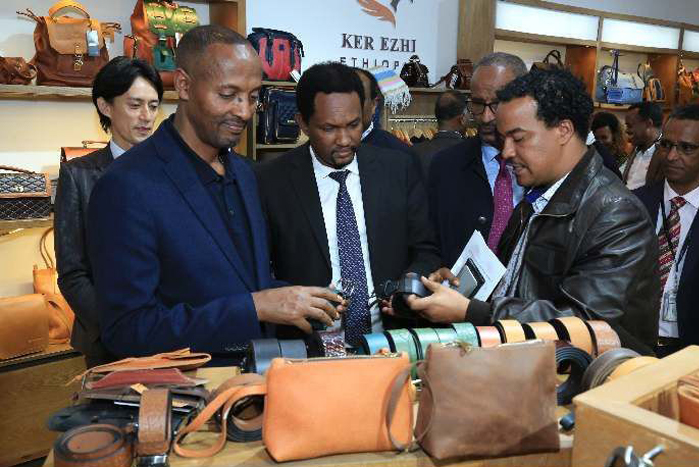
The government is wagging its finger at major sesame exporters suspected of under-invoicing, warning them to stay away from the act.
The Ministry of Trade & Industry sent a warning letter three weeks ago to the exporters, copying the National Bank of Ethiopia, the Ministry of Revenues, the Office of the Attorney General and the Ethiopian Commodity Exchange (ECX).
Signed by Misganu Arega, state minister for Trade & Industry in charge of the regulatory division, the letter urged the exporters to shy away from under-invoicing and threatened to take measures against those involved in under-invoicing including revoking their business licences and imposing other legal actions.
Continuous calls from the business community urging the Ministry to regulate the export sector, which is affected by unlawful practices and maladministration, triggered the Ministry to take the action, according to Misganu.
The Ministry, which is alarmed at the ever declining export revenue, sent the letters to exporters suspected of engaging in under-invoicing, according to Misganu.
"In the letter sent to the exporters, we've specified on which date and how much they under-invoiced their export values," Misganu told Fortune.
Some exporters have been buying the sesame from the ECX for an inflated value and exported the commodity with a price that is lower than what they paid at ECX. The Ministry also alleges that the companies used the foreign exchange they received from sesame exports to import products that generate huge amounts of profit, compensating for the value they lost in the export transactions.
Last month, sesame generated 563 million Br in revenue from transaction volumes of 8,902tn. The revenue was generated by 1,000 export licence holders in the country.
Apart from the warning letter, the Ministry vows to take different measures to curb under-invoicing, such as setting minimum prices for the commodities with the National Bank of Ethiopia, reviewing contract agreements of the exporters and reviewing the export licenses issued by the Ministry.
"Some of the exporters obtained the licenses not to transact exports but rather to get bank loans known as pre-shipment loans," Misganu told Fortune.
Between 55pc and 80pc of the illicit financial outflows leaving Ethiopia is traded using under-invoicing, which amounts to an estimated six percent to 23pc of the total value of the country’s trade, according to data from Global Financial Integrity, a Washington, DC-based think tank that produces analysis of illicit financial flows.
The Ministry also blames under-invoicing as one of the causes of declining export revenue. In the past 10 months of the current fiscal year, the country could only manage to get about 2.2 billion dollars from exports, an 8.4pc drop from the same period last year.
The revenue is also far below the government's target of earning 3.5 billion dollars in the reporting period.
Not all of the commodities underperformed in the reporting period. Exports of coffee, tea, flowers, fruit, vegetables, meat, textiles, electricity and seed oil were items showing strong performance in the reported period. Export of spices, fish, milk and dairy products, gold, chemicals and construction inputs, food and pharmaceuticals and metal, leather and leather products, on the other hand, showed a decline.
Along with under-invoicing, the Ministry attributes the growing contraband trade and commodity price declines in the international market as the reasons for the decrease in export revenue.
Two years ago, the National Bank of Ethiopia issued a directive aimed at monitoring under-invoicing by setting a minimum price for the imported items. The directive also requires that banks submit a copy of an import application weekly and a summary report of the list of approved applications monthly.
Most of the exporters sell commodities at lower prices only to get the forex, which they use to import other goods, according to Gezat Worku, the general manager of Ethiopian Coffee Exporters Association, which has 191 active members.
"To resolve the problem, six months ago we sent a request to the central bank calling on them to implement a minimum price," said Gezat.
Exporters are also supportive of the Ministry. Tamrin International Trading Plc, which is engaged in the export of agricultural commodities, received the same warning letter four months ago.
"The export sector isn't operating healthily," said Kebede Tilahun, operations manager of Tamrin. "The measures of the Ministry can rescue it."
However, Alemayehu Geda (Prof.), a university lecturer and a macroeconomist, believes that the problem is deep-rooted and says the warning cannot be a long-lasting solution.
The forex crunch, the absence of competitiveness of the export sector in the global market and the exporters' monopoly power of price setting are the major problems observed in the industry, according to Alemayehu.
"Supporting exporters to be competitive and setting a minimum price for export commodities can be solutions," Alemayehu, said.
Unless it is resolved, under-invoicing could cause capital flight, the rapid flow of money out of a country due to an event of economic consequence, according to Alemayehu.
In the coming fiscal year, the major assignment of the Ministry is setting a minimum price for commodities based on international commodity exchange figures, according to Misganu.
"We will also take the same measures on exporters of soybeans, coffee, red beans and mung bean," Misganu told Fortune.
PUBLISHED ON
Jun 15,2019 [ VOL
20 , NO
998]

Radar |

Fortune News | Sep 18,2022

Radar | Feb 03,2024

Fortune News | Sep 08,2019

Radar | Jan 19,2019

Radar | Mar 23,2024

Fortune News | Nov 05,2022

Radar | Oct 28,2023

Radar | Jul 29,2023

Radar | Sep 04,2022

Dec 22 , 2024 . By TIZITA SHEWAFERAW
Charged with transforming colossal state-owned enterprises into modern and competitiv...

Aug 18 , 2024 . By AKSAH ITALO
Although predictable Yonas Zerihun's job in the ride-hailing service is not immune to...

Jul 28 , 2024 . By TIZITA SHEWAFERAW
Unhabitual, perhaps too many, Samuel Gebreyohannes, 38, used to occasionally enjoy a couple of beers at breakfast. However, he recently swit...

Jul 13 , 2024 . By AKSAH ITALO
Investors who rely on tractors, trucks, and field vehicles for commuting, transporting commodities, and f...

Jun 28 , 2025
Meseret Damtie, the assertive auditor general, has never been shy about naming names...

Jun 21 , 2025
A well-worn adage says, “Budget is not destiny, but it is direction.” Examining t...

Jun 14 , 2025
Yet again, the Horn of Africa is bracing for trouble. A region already frayed by wars...

Jun 7 , 2025
Few promises shine brighter in Addis Abeba than the pledge of a roof for every family...